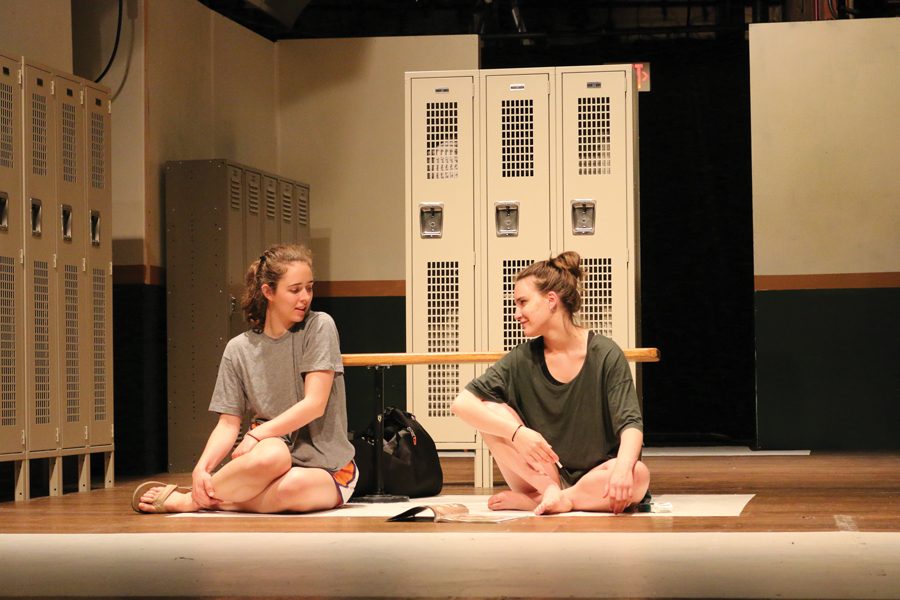Arts Alliance show shines spotlight on abortion, female friendship
Madeleine Fernando/Daily Senior Staffer
Two actors rehearse onstage for Arts Alliance’s spring show “Dry Land.” The play follows teenagers Amy and Ester who develop a friendship after Amy asks Ester to help her miscarry an unwanted pregnancy.
May 20, 2018
Communication junior Morgan Rielly is often drawn to new works that are relevant to current events, so when she heard of the play “Dry Land,” it immediately caught her attention.
The show tells the story of teenagers Amy and Ester, who develop a friendship after Amy asks Ester to help her miscarry an unwanted pregnancy, all amid the other dramas of high school. Written by Ruby Rae Spiegel, “Dry Land” will make its Northwestern debut as Arts Alliance’s spring show in Cahn Auditorium, running Tuesday through Thursday.
“This play allows for actors, and it allows for the Northwestern audience, to be able to deal with stuff that is so politicized in today’s culture and to be able to see it with these two characters who are so well-rounded and who really grapple with these issues in a personal level,” said Rielly, director of the play. “It feels relevant now, and it feels important to say now.”
The show turns the cavernous Cahn into an intimate high school locker room — where the majority of the play occurs — with the audience seated onstage, right next to the set. Communication junior Sydney Thomas, the play’s set designer, said this close setup intentionally highlights the way the locker room becomes the girls’ safe place amid their fears and uncertainties and brings the audience directly into their lives.
Thomas added that the inspiration for the intimate set came from Roman bath houses, which represent both a private and public space. In the same way, the locker room becomes Amy and Ester’s sanctuary, but it’s also a public space that can be accessed by many others outside of the girls’ relationship, she said.
Communication junior Zoë Olson, who plays Amy, said the show is an “honest take” on the difficulties of youth and womanhood, compounded by the challenge of facing an unwanted pregnancy.
“Amy feels like she doesn’t have anywhere to go that wouldn’t tell her parents, she doesn’t feel safe to make this choice with a professional and she doesn’t find those options available,” Olson said. “If we’re thinking politically, I think (it’s about) recognizing the need for young girls to feel like they have someone they can go to and do things like this safely.”
Communication sophomore Leo Scheck, the show’s producer, said the play is important in the context of today’s political movements and controversies.
But beyond the political subtext of abortion rights and women’s health care, Scheck said the show is also about “female strength and female friendship.”
“I hope people take away that they should be looking out for each other,” he said. “The people among us might be struggling for something, and people have issues and secrets that they will hide from you … We never want to make a person feel like they can’t talk about their problems.”
Communication junior Samantha Casesa, who plays Amy’s best friend Reba in the show, said the play balances the heaviness of Amy’s situation with light and funny moments within the girls’ friendship. She added that Amy’s story could happen to “so many people around the world” if health care options are restricted.
“Anyone who has ever had any type of opinion on anything related to Planned Parenthood is obligated to come see this play, whether that be good or bad or somewhere in the middle,” Casesa said. “Anyone from any viewpoint would benefit from seeing this play.”
Email: [email protected]
Twitter: @ruiqi_ch


